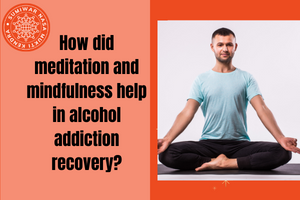How is Meditation and Mindfulness Helpful in Alcohol and Opioid Addiction Recovery?
Growing in popularity as an alternative therapy for alcohol addiction recovery is the use of mindfulness practices and meditation.
They can help people deal with the emotional and physical effects of alcoholism and reduce the likelihood that they will relapse.
Such programs are offered by Sumiwar Nasha Mukti Kendra to help people overcome addiction. To learn more about mindfulness and meditation’s advantages as well as addiction, keep reading.
How Does Alcohol Addiction Affect your Mind and Body?
Alcohol addiction can harm the mind and body in many different ways. Long-term alcohol addiction can harm the pancreas, liver, and brain.
Abuse of alcohol can also lead to depression and anxiety as well as other mental health problems. The psychological effects of alcoholism on cognition are among the most severe.
Alcohol is a central nervous system depressant that can impair coordination, cause cognitive decline, and cause memory loss.
Along with its negative effects on the mind, alcoholism can also harm the body. Long-term alcohol abuse can damage the liver, leading to cirrhosis, liver disease, and liver failure.
In addition, drinking too much alcohol has been associated with a higher risk of liver and breast cancer. Alcoholism can also make it harder for the body to absorb essential vitamins and minerals, which can lead to malnutrition and dehydration.
Can Meditation help you to leave Alcohol Addiction?
The ability to feel calm, control triggers, and avoid relapse are all benefits of meditation that have been shown to support addiction recovery.
Meditation can be a helpful holistic tool, but it cannot take the place of a thorough addiction treatment program with qualified medical assistance.
Mindfulness and meditation are used as therapy techniques in many rehabilitation centers, including. Whether you have been sober for a long time or are still in treatment, meditation can be very beneficial for your recovery.
What type of Meditation is Right for Alcohol Addiction?
Your preferences will determine the best type of meditation for you. Movement meditation may be a good fit for you if you like to be physically active.
Focused meditation might be helpful if you need to sharpen your focus and develop your ability to recognize bodily sensations. Selecting a meditation style that will aid in your recovery from addiction can be assisted by your treatment team.
#1. Mindful Meditation
Although mindfulness meditation emphasizes this, all forms of meditation call for being mindful (or in the moment). The goal of mindfulness meditation is to increase one’s awareness of the moment.
In order to practice this kind of meditation, one must examine their thoughts, feelings, and experiences without categorizing them as “good” or “bad” or “right” or “wrong.”
They breathe deeply and rhythmically, allowing feelings and thoughts to come and go without judging them.
#2. Spiritual Meditation
In spiritual meditation, the emphasis is on finding your connection to God or the universe through silence. Hinduism, Daoism, and Christianity all use it frequently. To enhance the experience, people frequently use essential oils like frankincense and sage.
#3. Focused Meditation
One of the five senses is the focal point of focused meditation for each participant. If a bell is ringing or a fire is burning in the fireplace, for instance, you might concentrate on those things.
Thoughts may stray, but it’s crucial to return your attention to the sense you’ve chosen to perceive with.
#4. Movement Meditation
Gentle movements such as gardening or nature walks are part of movement meditation. You concentrate on moving steadily and intentionally and on being physically present.
#5. Mantra Meditation
You would choose a specific word or phrase and repeat it during mantra meditation. This can be used as an alternative to breathing. The mantra can be recited aloud or softly, and doing so helps you concentrate on your surroundings.
The Benefits of Meditation and Mindfulness
Ongoing research examines the relationship between substance use and meditation. Recent research found that mindfulness-based interventions, such as meditation, could lower alcohol, cocaine, and amphetamine use.
The practice of mindfulness can help people learn coping mechanisms for discomfort like drug cravings or the side effects of substances, which may lower their risk of relapsing.
Benefits of Mental Health
The mental health of individuals is improved by meditation. Participants who practice meditation report:
- Stress levels are lower
- Less tension or anxiety
- mood improvement
- An increase in calm and mental relaxation
Physical and Other Health Advantages
According to recent research by medical professionals, meditation can also help treat a wide range of physical and mental health conditions, including:
- Their blood pressure is high
- Inflammatory Bowel Syndrome
- Chronic Illness
- Anxiety
- Depression
- Insomnia
- Pain
- Addiction to Smoking
There are many more advantages to meditation. Although mindful meditation cannot treat cancer, studies have shown that it can help patients with lung and breast cancer manage their pain, stress, low self-esteem, and exhaustion.
According to one study, people with chronic pain who meditated saw pain levels drop by up to 42%, which improved their sleep, mood, and level of activity.
The value of Mindfulness Meditation
#1. Increasing self-awareness:-
People can become more observant and better able to recognize situations that make them crave alcohol by participating in mindfulness meditation at a center for alcohol addiction.
By increasing their awareness of their emotions, feelings, and bodily sensations, people can control their urges and make more thoughtful decisions.
#2. Manage your stress and anxiety:-
Stress and worry can often be the start of an alcohol addiction. Mindfulness meditation can assist individuals in lowering stress and anxiety by demonstrating how to focus on the present moment and let go of unfavorable thoughts and feelings.
#3. Increasing emotional control:-
Controlling one’s emotions is one of mindfulness meditation’s main benefits. To respond more effectively to their thoughts and feelings, people learn to accept them without passing judgment. It can help those who are trying to recover from alcohol addiction by reducing impulsive behavior.
The best alcohol rehabilitation center in Patna, Sumiwar Nasha Mukti Kendra can help you with this.
Conclusion
Meditation and mindfulness can be one of the best and beneficial practices for addiction recovery treatment that helps you to come out from Alcohol addiction
- This is very helpful for addiction treatment.
- Meditation and Mindfulness help patients with lung and breast cancer manage their pains, stress, etc.
Hopefully, this article helps you to understand the advantages of meditation and mindfulness in Alcohol addiction treatment.



